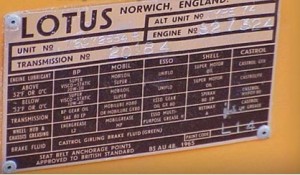 Think of it as the automotive equivalent of human DNA. A vehicle identification number is an alphanumeric identifier that tells everything about a vehicle’s unique history. A VIN can unlock secrets about a cherished car or truck. But, as this story illustrates, it can sometimes make for a big hassle, too.
Think of it as the automotive equivalent of human DNA. A vehicle identification number is an alphanumeric identifier that tells everything about a vehicle’s unique history. A VIN can unlock secrets about a cherished car or truck. But, as this story illustrates, it can sometimes make for a big hassle, too.
For most, a vehicle identification number is little more than a jumble of letters and digits that have no bearing on their use and enjoyment of a favorite vehicle. The smallest error in the VIN, however, can lead to unwanted headaches when it comes time to register your vehicle.
Take the case of one Canadian historic vehicle owner who recently contacted the HVA office looking for help with a cross-border registration problem caused by an inaccurately-recorded VIN.
Wrong Number Woes
It started with the purchase of the vehicle in California over eight years ago. The vehicle was then transported north of the border into Ontario. The importation process went smoothly with no one—not the vehicle’s new owner nor the agents in Canadian customs—noticing any errors associated with the vehicle’s VIN.
But when it came time to re-register the car, the VIN on the California DMV title documents and that on the vehicle itself did not match. The VIN on the title from the California DMV had an additional “0” not present on the actual VIN plate on the vehicle.
This tiny inaccuracy turned into a big problem after the Ontario Ministry of Transport informed the buyer that the VIN was, in fact, incorrect and would need to be corrected prior to being able to register the vehicle in Ontario.
Naturally, the next call made by the owner was to the vehicle’s place of origin, where the news got even worse. California officials insisted the vehicle would have to return to the state for a full inspection—not a feasible option for a car sitting halfway across the continent in Ontario.
VIN-dication
After multiple visits to the Ontario Ministry of Transport, the owner was informed that his only remaining option was to have the vehicle inspected and the VIN confirmed by a national automobile club or similar organization. Enter the Historic Vehicle Association’s Canadian representatives.
Upon learning of the situation following an email from the vehicle’s owner, Nigel Matthews, the HVA’s Canadian correspondent and President of the Specialty Vehicle Association of British Columbia, was sure he could help.
As the North American representative for FIVA, the HVA qualifies as an acceptable organization to verify the VIN’s accuracy and authenticity. By providing the Ontario Ministry of Transport with a photograph of the VIN plate and a letter confirming its accuracy, a locally based FIVA/HVA “scrutineer” dispatched by Matthews was able to provide the necessary documentation to satisfy Canadian officials and correct the error on the original California DMV title.
Preventative Measures
To help avoid similar frustrations, make sure the VIN on your vehicle matches the VIN on your title paperwork. It can also be helpful to review your VIN using an online decoder designed to help you decipher the alphanumeric code unique to your vehicle. Simple proactive measures like these can often prevent major headaches down the road.
Should you have any questions or concerns, please feel free to contact the HVA at 866.922.9397, or send an email detailing the problem to info@historicvehicle.org.
